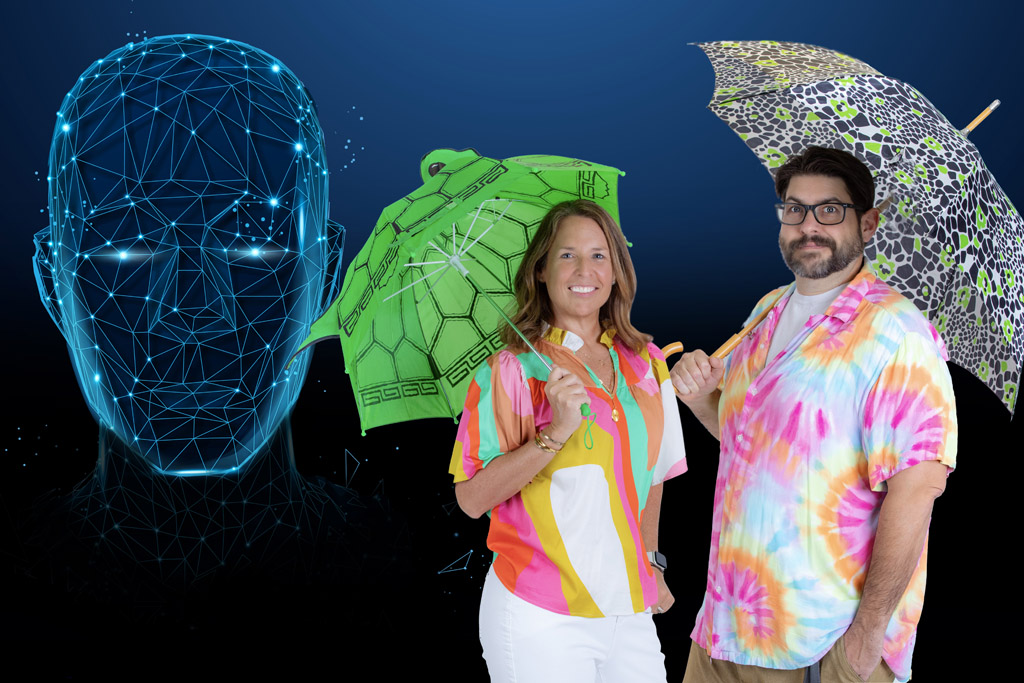Courtneys Opinion: AI is cheating…don’t do it for class projects!
The threat of artificial intelligence (AI) taking our jobs has stolen headlines of late. Last week Law & Order framed a guy for murder using AI. Last month, Barry found that even his social media channels were asking if he’d like help crafting a post – to which he obviously replied with something along the lines of “I’m a writer, I don’t need help writing.”
But like most of our debates, the question Facebook posed to Barry prompted a text exchange and alas, we landed on this month’s topic.

Barry asked AI to argue in favor of itself, which AI happily did, given its lack of humility and situational awareness paired with its enormous ego.
For me, I recalled with a chuckle a situation I encountered in December, as the semester at USCB ended. A lot has changed for me and for students since I started teaching at the college level in 2002.
First, social media appeared, and students found that while being my “friend” on Facebook could be cool, it also had the potential to backfire. When Maria told me that she’d be missing class to attend her aunt’s funeral and I subsequently saw the photos she posted from Disney World she was caught and quickly learned the “Don’t post anything on social media that you wouldn’t want your grandmother or college instructor to see” lesson.
In addition, the internet made plagiarism easier. University and college libraries went digital with resources for downloading every journal article ever penned, which made copy-and-paste a literal click (or two) of the button. Frankly, on the teaching side, Google made catching a plagiarizer easier than ever.
AI is the next technological hiccup in the “how the heck do we get students to do their own work” conundrum.
At the end of the fall semester, one of my students threw a Hail Mary, completing his final two assignments and five extra credit assignments overnight. This was a remarkable feat, given his inability to produce more than half of his assignments during the first 15 weeks of the regular semester schedule.
These late-night miracles appeared to me to be a product of AI generation. The work was not consistent with the previous work he had completed but, more importantly, the work lacked the human/personal element that I would expect in these assignments. For example, he wrote and delivered his final “tribute” speech about me (no doubt part of the Hail Mary play), but all the references were about “the teacher.” My name was not in the narrative anywhere – nary a nod to Ms. Hampson. He also stumbled over several words during his presentation, as if reading them for the first time.
I am a firm believer in the concept that if you had written and practiced the speech you would have known how to pronounce those words and/or swapped them out if you struggled with them.
One of my assignments is a group project that requires the students to identify a local nonprofit and spend one three-hour class period volunteering. This class chose the Deep Well Project and worked in their food pantry unloading, sorting, and shelving non-perishables.
Unfortunately, the reaction paper the student wrote about the experience addressed their “passion for environmental stewardship,” which is not the takeaway from an afternoon dedicated to food insecurity and feeding families at Thanksgiving.
But I suspect that asking AI to generate a paper about the Deep Well Project might return a result related to water and wells. Sigh.
So, alas, my position on using AI is that it is cheating. Maybe that is easy to say for someone who loves writing and considers herself a creative (and a rule follower). USCB has policies that are quite explicit about what can happen if a student uses others’ work – including AI – on course assignments. The AI-generated work belongs to the AI, not to the student. Eek.
Needless to say, I took this semester off to gather my thoughts … and instead, I shared them here.
Barry’s Opinion: Team Human. AI isn’t better than us…yet.
ChatGPT says: Artificial Intelligence (AI) has become an indispensable tool in various aspects of our lives, revolutionizing industries, enhancing efficiency, and contributing to significant advancements. One of its key contributions lies in automating repetitive tasks, allowing humans to focus on more complex and creative endeavors. This increased efficiency translates into cost savings for businesses and improved productivity.
AI’s impact extends beyond business, touching fields such as healthcare, where it aids in diagnostics, personalized treatment plans, and drug discovery. The ability of AI algorithms to analyze vast amounts of medical data enables quicker and more accurate diagnoses, ultimately saving lives. In research and development, AI accelerates innovation by predicting outcomes, simulating scenarios, and identifying patterns that might elude human researchers.
The integration of AI into everyday devices has transformed the way we interact with technology. Virtual assistants, powered by AI, understand natural language and assist users with tasks, schedules, and information retrieval. AI-driven recommendation systems enhance our entertainment experience, suggesting movies, music, or products based on individual preferences.
In education, AI facilitates personalized learning experiences, adapting to students’ needs and providing targeted support. It automates administrative tasks for educators, freeing up time for more meaningful interactions with students. Additionally, AI-driven tools aid in the assessment of educational outcomes, ensuring a more comprehensive understanding of students’ progress.
In the realm of transportation, AI plays a crucial role in the development of autonomous vehicles, promising safer and more efficient transportation systems. AI algorithms analyze traffic patterns, optimize routes, and contribute to the overall improvement of urban mobility.
However, it’s crucial to approach the expansion of AI with ethical considerations in mind. Striking a balance between innovation and responsible use is essential to harness the full potential of AI while minimizing potential risks. As we continue to advance in AI technology, its utility will likely expand, offering solutions to complex challenges and reshaping the way we live and work.
Barry says:
ChatGPT makes some valid points up there. (Possibly. I zoned out halfway through reading it.) But today seems like a particularly good day for me to show this robot how human beings make a point. For one thing, I’m writing this on the seventh anniversary of the day I decided to quit my job and write full time, depending solely on my ability to tap a keyboard to feed my family.
For another, I’ve just completed my biannual marathon of only the bad Terminator sequels, so I’ve seen how even crappy writing can topple the mightiest of machines.
So, it’s time to put my own crappy writing to work in joining the human resistance to this cybernetic menace before it’s too late. (If possible, you might want to put on Brad Fiedel’s suite from “The Terminator” while you read this). Because when I think about AI, there’s one word I keep coming back to: “Yet.” It’s a powerful word, if you think about it.
Because “yet” encompasses all the things AI can’t do. “Yet” can imagine words that haven’t already been written, find pathways that don’t exist. “Yet” doesn’t stand on the shoulders of giants; “yet” provides a shoulder for the next giant to stand on.
It’s a word that encompasses the human capacity for imagination, adding new ideas to the world rather than remixing old ones.
When I see how terrible AI is at writing, I always come back to the word “yet.” Because I’ve read what AI writes, and right now it’s awful. I’ve dabbled in using ChatGPT as a writing assistant, and it felt like I was working with someone who was trying really hard not to let on how drunk they were.
For example, I asked it to proofread a menu behind me for one client. ChatGPT kept insisting I had misspelled the word “mediterrean,” a word that, while technically a typo, appeared nowhere in the document I’d asked it to proof. Willing to give the robot a second chance, I asked it to write some photo captions for another client. ChatGPT then gave me several variations on “boy this sure is a nifty photo” before I decided to call it an Uber and give it the rest of the day off to sober up.
So ChatGPT can’t do what I do. But then along comes that word. “Yet.”
Because it’s only a matter of time before ChatGPT can do what I do as well as I can. And before long, it will be able to do what you do, whatever it is. It doesn’t even need to be your job. By virtue of reading this, you are under threat of being replaced as the intended audience for what I’m writing. Already we have publications like Sports Illustrated laying off their entire staff in place of AI writers. These bots will write content that will be read by other bots on search engines to drive clicks, their words trickling down to humanity only after the machines are done entertaining one another.
It’s an existential threat, not just to writers or educators. Already we’re seeing it seep into politics, throwing the whole world into chaos. OK, further into chaos. Like 12% more chaotic than it already is. So we need to band together – not just mortal enemies like Courtney and me. All of us. Doctors. Lawyers. Librarians. Bus drivers. Mail carriers. Politicians, or at least the ones that are actually human.
If you’re human, you’ve got skin in the game. If you’re a machine, you’re winning this round.
But we’ll be back.
My name is Barry Kaufman. I’m no John Connor, but if you’re reading this, you are the resistance.


